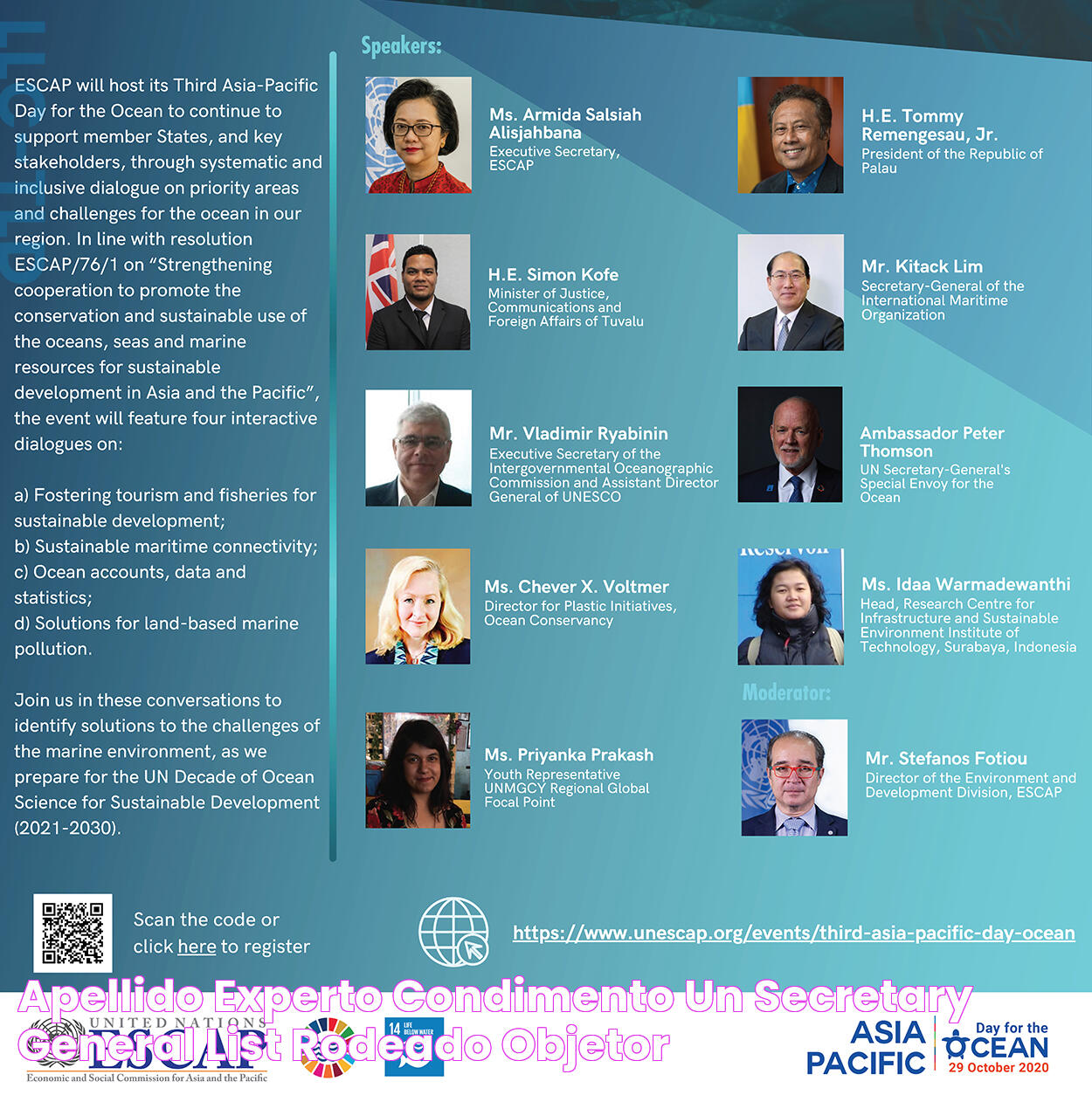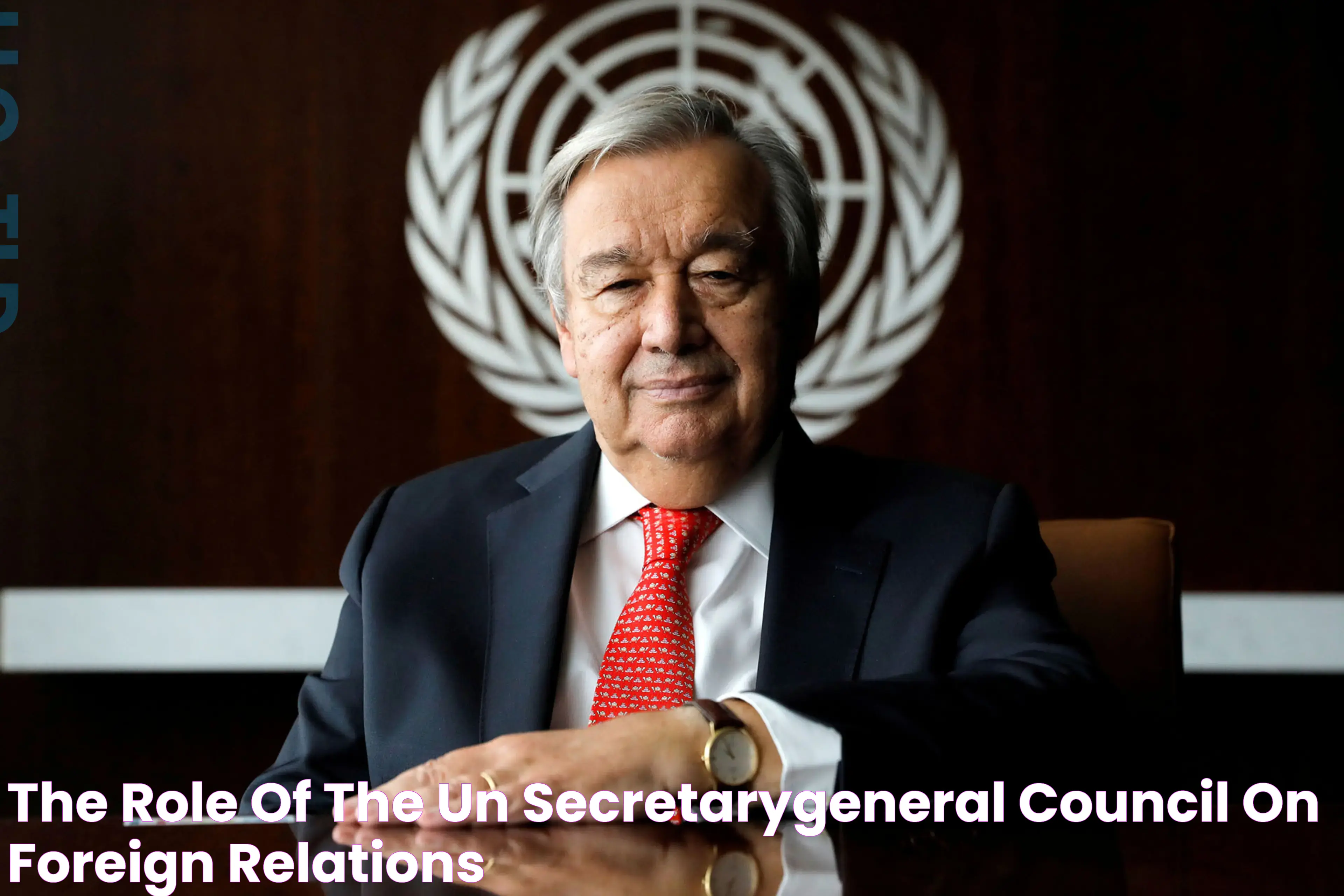The United Nations (UN) is an international organization founded in 1945, with the primary aim of promoting peace, security, and cooperation among countries. At the helm of this global entity is the Secretary-General, a position of significant influence and responsibility. The UN Secretary-General serves as the public face of the organization, tasked with executing its mission and facilitating international dialogue. Understanding the history and legacy of those who have held this prestigious office provides valuable insight into the UN's evolution and global diplomacy.
The role of the Secretary-General has been critical in navigating world events, crises, and negotiations. The list of individuals who have served in this capacity demonstrates the diverse backgrounds and experiences that have shaped the UN's approach to global issues. From the inception of the position to the present day, each Secretary-General has brought unique perspectives and strategies to the table, reflecting the changing dynamics of international relations.
Exploring the UN Secretary-General list not only highlights the achievements and challenges faced by these leaders but also underscores the importance of the UN in addressing global concerns. By examining their tenures, we gain a deeper understanding of the complexities involved in managing international affairs and the impact of their leadership on the world stage. This comprehensive guide provides an in-depth look at the individuals who have guided the UN, their contributions, and the lasting influence of their work.
Read also:Real Madrid Hoy Behind The Scenes And Current Updates
Table of Contents
- Biography of the UN Secretary-General
- Personal Details and Bio Data
- Historical Overview of the UN Secretary-General List
- What Are the Responsibilities of the UN Secretary-General?
- The Selection Process: How Is the UN Secretary-General Chosen?
- First Secretary-General: Trygve Lie's Legacy
- Dag Hammarskjöld: A Diplomatic Pioneer
- U Thant: Navigating the Cold War
- Kurt Waldheim: Challenges of the 1970s
- Javier Pérez de Cuéllar: Conflict Resolution and Peacekeeping
- Boutros Boutros-Ghali: Reform and Strife
- Kofi Annan: Champion of Human Rights
- Ban Ki-moon: Focus on Climate Change
- António Guterres: Current Challenges and Vision
- FAQs About the UN Secretary-General
- Conclusion
Biography of the UN Secretary-General
The Secretary-General is often regarded as the "world's diplomat-in-chief." They represent the United Nations on the global stage, mediating conflicts, advocating for peace, and leading initiatives that address pressing global issues. The position was established with the creation of the UN in 1945, and the Secretary-General's role has evolved over time, shaped by international events and the changing needs of the organization.
Personal Details and Bio Data
| Full Name | António Manuel de Oliveira Guterres |
|---|---|
| Date of Birth | April 30, 1949 |
| Nationality | Portuguese |
| Term Start | January 1, 2017 |
| Previous Positions | Prime Minister of Portugal, United Nations High Commissioner for Refugees |
Historical Overview of the UN Secretary-General List
The UN Secretary-General list is a testament to the diverse and dynamic leadership that has steered the organization through decades of change. Starting with Trygve Lie of Norway, the first Secretary-General, each leader has faced unique challenges and has left an indelible mark on the UN's legacy. From managing Cold War tensions to addressing modern-day crises like climate change and global pandemics, the Secretary-General's role is pivotal in shaping international policies and fostering collaboration among nations.
What Are the Responsibilities of the UN Secretary-General?
The Secretary-General's duties are extensive and varied, encompassing administrative, diplomatic, and advocacy responsibilities. Key responsibilities include:
- Overseeing the UN Secretariat, the organization’s executive arm
- Facilitating peacekeeping operations and conflict resolution
- Advocating for human rights, sustainable development, and humanitarian aid
- Engaging with member states to promote international cooperation
- Representing the UN at global events and forums
- Responding to global crises and emergencies
The Selection Process: How Is the UN Secretary-General Chosen?
The selection of the UN Secretary-General is a nuanced process involving multiple stages and deliberations. The process is as follows:
- The Security Council recommends a candidate to the General Assembly.
- The General Assembly then votes on the recommendation, requiring a majority for approval.
- The term is for five years, with the possibility of reappointment.
The selection process is often influenced by geopolitical considerations, with member states lobbying for candidates who align with their interests and priorities. The goal is to appoint a leader who embodies neutrality, diplomacy, and a commitment to the UN’s values.
First Secretary-General: Trygve Lie's Legacy
Trygve Lie, a Norwegian politician and diplomat, was the UN's first Secretary-General, serving from 1946 to 1952. His tenure was marked by the post-World War II recovery and the early stages of the Cold War. Lie faced significant challenges, including the Korean War and the Berlin Blockade, which tested the UN's capacity to maintain peace and security.
Read also:Insights Into Syria Historical Context And Modern Challenges
Dag Hammarskjöld: A Diplomatic Pioneer
Dag Hammarskjöld, from Sweden, served as Secretary-General from 1953 until his untimely death in 1961. He is remembered for his dedication to peacekeeping and his efforts to mediate conflicts during the Suez Crisis and the Congo Crisis. Hammarskjöld's leadership style and commitment to the UN's principles have left a lasting impact on the organization.
U Thant: Navigating the Cold War
U Thant, a Burmese diplomat, was the first non-European Secretary-General, serving from 1961 to 1971. His tenure was defined by the Cuban Missile Crisis and the Vietnam War, during which he played a crucial role in facilitating dialogue and promoting peace. U Thant's leadership emphasized the importance of multilateralism in addressing global challenges.
Kurt Waldheim: Challenges of the 1970s
Kurt Waldheim, an Austrian diplomat, served as Secretary-General from 1972 to 1981. His tenure was characterized by significant geopolitical shifts, including the Arab-Israeli conflict and the decolonization of Africa. Waldheim's leadership focused on expanding the UN's peacekeeping operations and addressing global economic disparities.
Javier Pérez de Cuéllar: Conflict Resolution and Peacekeeping
Javier Pérez de Cuéllar, a Peruvian diplomat, served as Secretary-General from 1982 to 1991. He is credited with reinvigorating the UN's role in conflict resolution, most notably through his efforts in mediating peace in the Iran-Iraq War and the withdrawal of Soviet troops from Afghanistan. Pérez de Cuéllar's tenure marked a period of increased UN involvement in global peacekeeping.
Boutros Boutros-Ghali: Reform and Strife
Boutros Boutros-Ghali, an Egyptian diplomat, served as Secretary-General from 1992 to 1996. His tenure was marked by efforts to reform the UN's structure and improve its efficiency. However, Boutros-Ghali faced criticism for the UN's handling of the Rwandan Genocide and the Bosnian War. Despite these challenges, he is credited with initiating important dialogues on peace and development.
Kofi Annan: Champion of Human Rights
Kofi Annan, from Ghana, served as Secretary-General from 1997 to 2006. He was a vocal advocate for human rights and sustainable development, launching initiatives like the Millennium Development Goals. Annan's leadership was instrumental in addressing global health issues, such as the HIV/AIDS pandemic, and he received the Nobel Peace Prize in 2001 for his efforts to revitalize the UN.
Ban Ki-moon: Focus on Climate Change
Ban Ki-moon, a South Korean diplomat, served as Secretary-General from 2007 to 2016. His tenure was marked by a strong focus on climate change and environmental sustainability, leading to the adoption of the Paris Agreement in 2015. Ban Ki-moon also prioritized gender equality and the empowerment of women, advancing the UN's agenda on social justice.
António Guterres: Current Challenges and Vision
António Guterres, from Portugal, is the current Secretary-General, having assumed office in 2017. His leadership has been defined by a commitment to multilateralism and global cooperation. Guterres has emphasized the need for a united global response to challenges such as the COVID-19 pandemic, climate change, and geopolitical tensions. His vision includes strengthening the UN's capacity to address complex global issues and fostering inclusive development.
FAQs About the UN Secretary-General
Here are some frequently asked questions about the UN Secretary-General:
- Who was the first UN Secretary-General?
Trygve Lie from Norway was the first UN Secretary-General, serving from 1946 to 1952. - How long does a UN Secretary-General serve?
The term is for five years, with the possibility of reappointment. - What are the main responsibilities of the UN Secretary-General?
The Secretary-General oversees the UN Secretariat, facilitates peacekeeping operations, advocates for human rights, and represents the UN at global events. - Who is the current UN Secretary-General?
António Guterres from Portugal is the current Secretary-General, serving since 2017. - Has a woman ever served as the UN Secretary-General?
As of now, no woman has served as the UN Secretary-General, although there have been female candidates. - What is the significance of the UN Secretary-General's role?
The Secretary-General is crucial in mediating conflicts, advocating for peace, and leading initiatives that address global issues.
Conclusion
The UN Secretary-General list is a reflection of the diverse leadership that has guided the organization through decades of change and challenges. Each Secretary-General has left an indelible mark on the UN's legacy, shaping international policies and fostering collaboration among nations. As the world continues to face complex global issues, the role of the Secretary-General remains pivotal in promoting peace, security, and development. Through their leadership, the UN continues to strive for a more equitable and sustainable future for all.

